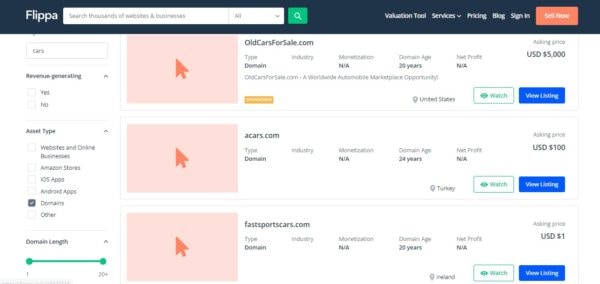Why You Should Use The .com For Your Domain
There have been many ‘young pretenders’ such as .ai and .io, but .com reigns supreme in the world of domain names. NameExperts.com Director Joe Uddeme explains why a .com URL is still the one to aim for in most cases. Using a .com domain offers several significant advantages that can positively impact your brand’s identity, visibility, and long-term growth. To this day, a .com domain registration transfer is often the best choice for a new domain and purchase in your desired price range. Buying a domain name can be daunting and less secure without the proper knowledge of the transfer process, which is where a top domain brokerage service can help. Price range is a major factor when it comes down to buying your URL – or selling it – and a broker can streamline the whole process. Global Recognition A .com website has the most-recognized Top Level Domain: The .com domain extension is known worldwide and widely respected. When users see a .com domain, they immediately associate it with a legitimate organization. It’s the default extension most people think of when typing a domain name or securing one for ownership and transfer. It’s a key consideration when you want to acquire a premium domain name. Trust Factor Buyers tend to trust websites that have a .com domain over other top-level domains. Most International registrars support the transfer of .com and offer additional features. Since it’s the most established and widely used domain extension, it adds an element of professionalism, security and reliability to your marketing plan. This helps visitors with peace of mind and makes them more likely to engage with your entity and feel more secure. If you’re involved in domain name portfolio management, it’s a good bet you’ll have one or more .com names in your collection. Memorability and Ease of Use A short, catchy .com domain is easier for people to recall. People are conditioned to associate websites with .com, making it more likely that they’ll remember your complete domain name when searching for your business or product suite. This improves free direct visit traffic, where users type your domain into their browsers, leading to higher engagement and conversions on your site to protect your brand and keep you covered. Because .com is the default TLD, potential individuals are more likely to accidentally type yourbusiness.com even if your actual website is on a different extension (e.g., .net or .org). Owning the .com prevents you from losing traffic to other sites and allows your client to complete the navigation. It’s all part and parcel of a great brand name strategy. Customer Expectations .COM: Customers often expect businesses to use .com for both websites and email addresses. If a site uses yourbusiness.com for its website but an alternative domain like .net or .biz for its email, it could create confusion or even raise questions about its legitimacy, even if it is catchy. A professional email address ending in .com adds security and simplicity – and attracts more visitors to the domain to achieve success. Using the same .com domain for both your website and professional email helps create a cohesive brand identity for your new domain and keeps you protected and ready to continue to build your organization. Other TLDs: If your website is hosted on a .com domain but your email uses different domain extensions (e.g., [email protected]), it can lead to confusion and undermine the consistency of your brand. Clients may accidentally send emails to [email protected] because they assume your email matches your website domain. Credibility with Investors and Partners Perception of Success: Having a .com domain is often seen as a sign that a brand is more established, successful, and serious about its online presence. Investors, acquisition partners, and other account stakeholders may view your brand more favorably if it has secured a .com domain, especially if you’re targeting a global audience or providing services or support. Domain as a Digital Asset: A .com domain purchase that you intend to hold onto can also become a valuable long-term equity play. Premium .com domains tend to appreciate over time, adding value to your organization if you decide to sell or expand services to maximize the best price for transfer. Register top keywords that identify with your services or product offerings or answer questions. Purchase a .org for your non-profit or a .net for your network platform. Alternative TLDs such as .net and .org may each hold value to the domain name owner and may be attractive to the buyer as a cheaper alternative, based on the availability of domains. SEO and Search Engine Benefits Higher Click-Through Rates (CTR): A .com domain will ensure greater click-value in search engine results. Since users trust .com websites more, search engines like Google may favor them in search rankings, especially for advanced searches. Even if a domain extension doesn’t directly impact SEO, user behavior (like click-through rates) does, and .com domains tend to perform better in this area. Backlink Value: When other sites link to you, they may be more willing to link to a .com site due to its perceived authority and security. High-quality backlinks are essential for SEO performance, and .com domains tend to naturally attract more of those links. International Appeal Global Acceptance: If your organization operates globally or plans to expand internationally, a .com domain is universally recognized and accepted across borders and everyday life. Country-specific domains (like .co.uk or .de) can limit your reach or cause confusion in markets outside that specific country. They can also cause transfer issues. Consistency in Branding: As your organization grows, maintaining a consistent identity across different regions is essential. A .com domain helps establish a unified web presence, making it easier for customers worldwide to find and recognize your branding and url. Competitive Advantage Competitor Safeguard: Owning the .com version of your entity name prevents competitors from using it. Even if you currently use a different extension for your account, a competitor could purchase the .com and use it to divert traffic, confuse clients, or dilute your message or image and hurt security. Always be sure to check out a .com’s history before buying, though – there could be some nasty surprises if it has been used before. Professionalism: Many well-established businesses, particularly in competitive industries, prefer .com domains. If a competitor has the .com version of a similar name, they may be seen as more professional or legitimate than a business name using a less common extension. Having a .com gives you an edge in appearing professional and trustworthy. Versatility to Ensure Growth Future-Proof: As your network grows, the .com extension is flexible enough to accommodate expansions into new products, services, or geographic markets. Unlike some niche TLDs, which may be associated with specific industries (like .tech or .store), a .com can grow with your entity and remain relevant in any market. Resale Value: Premium .com domains can become valuable assets if your organization is ever sold or merged. The high demand for .com domains, especially short, brandable ones, means they often increase in value over time and make them an easier sale for the seller in a reasonable range. Some names exceed all expectations, however, and command seven-figure price tags or higher. What other TLDs Are Good Options? Clients ask regularly if there are decent top-level domain alternatives to the .com for transfer. There are many, including .org, .net,.co, .io, .ai, .xyz and .club domains that a degree of power and authority. Top Extensions: These extensions are popular for use in the crypto and web 3 space. There are many organizations that capitalize on the generic value such as the banking industry with the .bank top-level domain. With more than 2,500 new GTLD domain extensions, you can now register and transfer anything from .legal to .car for your business, which is worth knowing if you’re securing a unique domain name for a startup in particular. Here are a list of some top extensions and how they’re often used: .ai: artificial intelligence, machine learning support, reasonable renewal cost .net: internet infrastructure sites, more technical, fairly reasonable renewal cost .co: abbreviation for commerce, corporation and community .org: non-commercial org and non-profits .io: tech sites, business or commercial use support You definitely don’t need to use a website builder for every domain name you purchase. Make sure you forward any additional domain names you register to your primary site and add a secure server to protect your organization. The .com Domain Should Be Your First Choice When we talk about long-term investing and ROI, we think about the stock market, commercial or residential real estate investing, gold bullion and Forex – but domain investing is a legitimate business pursuit, too. Domain names hold value and add instant equity to the branding strategy and ownership in the purchase and sale of domain names. There are hundreds of thousands of prime opportunities to invest in the domain space – and as the last 30 years have shown, the .com is the most credible TLD on the market, both domestically and abroad. This holds true if you are buying your domain for your business or to hold and transfer at a later date. Whether this is your first domain or you own many, the .com creates easy accessibility for consumers and brands alike. Brand Protection: Companies work hard to protect their domain brands, accounts and marketing tactics. They invest millions of dollars and countless resources at building that beach-front real estate and maintaining their Internet presence in the world. As leaders in the domain space, the NameExperts.com team continues to recommend the .com as the superior domain with considerable upside and long-term equity potential. Case Study: Tesla.com domain acquisition Here’s a case study of a .com domain acquisition transfer that highlights the importance and benefits of acquiring a premium .com domain for a business. The study involves Tesla’s acquisition of Tesla.com. Background: For many years after its founding, Tesla, the electric vehicle manufacturer, operated under the registered domain TeslaMotors.com. Despite its growing success, the entity didn’t own the highly sought-after Tesla.com domain. TeslaMotors.com was functional, but having Tesla.com would better align with the company’s image as it expanded beyond cars to include energy products like solar panels and batteries. The domain Tesla.com was originally owned by a man named Stuart Grossman, who had registered it long before the organization existed. Grossman wasn’t actively using the domain, but he also wasn’t interested in selling it easily, making the acquisition a challenging and lengthy process. The Acquisition Process: Need for Rebranding: As Tesla grew and became a household name, the organization realized that TeslaMotors.com was limiting its branding. The “Motors” in the domain name suggested a narrow focus on cars, whereas Tesla’s long-term vision encompassed energy solutions, solar products, and batteries. The organization needed a simpler, cleaner domain—Tesla.com—that reflected its image as a leader in the broader tech and energy sectors. Complex Negotiation: Elon Musk, Tesla’s CEO, revealed that acquiring Tesla.com was a difficult process, taking over 10 years of negotiations. The domain owner, Grossman, was reluctant to sell the name for many years, leading Tesla to offer a significant amount to finally secure it. Musk later hinted that they had paid $11 million to acquire the domain, though exact figures weren’t officially disclosed. Hands-on Approach: Tesla’s approach to acquiring the domain involved: Patience: Tesla waited until the domain owner was ready to sell, all while continuing to build their company. Persistence: Tesla remained in contact with the owner over a long period, signaling ongoing interest and ensuring the owner knew they were serious buyers. Strategic Timing: Tesla finally closed the deal when they were ready to reposition their entity from just a car line to a broader energy and technology company. Outcome: In 2016, Tesla successfully acquired and completed the transfer of the Tesla.com domain and immediately rebranded their website and digital assets. This acquisition allowed Tesla to secure its concept and image across all its product lines and simplify its online presence and customer support tools. About the author Joe Uddeme is Director and Principal of Name Experts, one of the world’s leading domain name brokerage services. He has overseen domain name sales and acquisitions totaling more than $150 million and is renowned worldwide as a go-to expert in buying and selling premium domains. Joe’s specialty is helping clients secure .com domain names that appear unreachable – and at the right price, too. Contact Joe at: [email protected]











